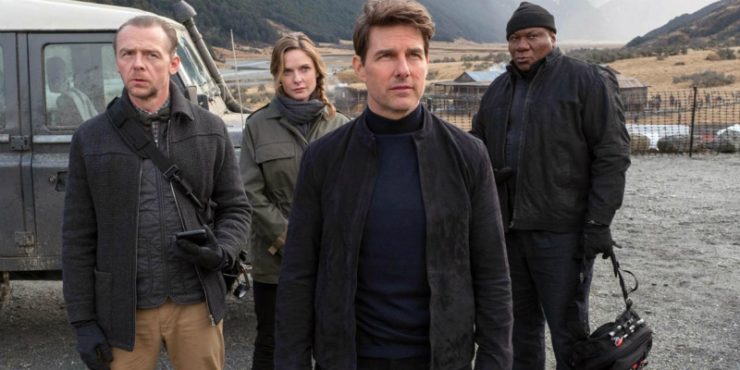To the degree that every Tom Cruise movie is actually, in its core, about Tom Cruise, Mission: Impossible – Fallout is part redemption tale and part swan song, part relinquishment of the throne and part declaration of his glory upon it. Fallout is mythological, sentimental and very much aware of the state of the Mission: Impossible franchise and its 56-year-old star. Cruise’s age is always a story because of the amount of work he does to defy it, and his devotion to these films and their death-defying stunts is the most touching relationship between a star and his franchise that I’ve ever seen. Cruise is as devoutly committed to the aura of Tom Cruise as the character Ethan Hunt is to protecting the world. Cruise is doing this all for himself, which is why he’s one of our greatest, most unique movie legends. His vanity pays off for the audience nearly every time.
Fallout‘s plot is more of the same. It even brings back writer-director Christopher McQuarrie, who directed the fifth installment, Rogue Nation, thus making him the first filmmaker to direct two films in the series. Rogue Nation and its immediate predecessor, Ghost Protocol (directed by Brad Bird), were shifts in the franchise, a trend toward lower stakes and bigger laughs, zanier stunts and more screen time for Simon Pegg. Fallout‘s closest comparison is Mission: Impossible III, the J.J. Abrams take that upped the emotional firepower and included more cerebral performances from the likes of Philip Seymour Hoffman and Billy Crudup. There’s little cerebral about Fallout but it does have III‘s humane attachments, and plays upon Ethan Hunt’s compassion and empathy. It also manages to pull off the very best action set pieces the series has ever seen.
What Cruise and McQuarrie have here in Fallout is a movie that continues the narrative complexities of the other Mission: Impossible films while incorporating intense action akin to Mad Max: Fury Road, where the force of the filmmaking pounds the audience in the chest, rushing in with enough adrenaline to sustain a 147 minute movie with close to no lag. Fallout takes Ethan and crew through Paris, London and Northern India, driving small cars, large helicopters, stylish black motorcycles and at one point a freight truck. In all of these cities, Ethan is forced to run like mad, often from various people searching to capture him. Once again, his own government feels unsure about his motives, and once again every supporting character is a possible turncoat waiting to uproot Ethan and the entire IMF system.(A special mention of Wade Eastwood, the film’s excellent stunt coordinator.)
Ethan’s usual crew is there, including the dependable Luther (Ving Rhames, the only person besides Cruise to be in every movie of the franchise), the nebbish Benji (Pegg), and the stunning but deadly MI6 agent Ilsa Faust (Rebecca Ferguson). They’re joined by August Walker (a hulking, mustachioed Henry Cavill), a CIA assassin forced upon the mission by Langley director Erica Sloane (Angela Bassett). Walker is a brute-force hooligan used by Sloane as a blunt instrument, and his reputation for blood-thirst precedes him. Both the CIA and the IMF want to find a mysterious man named John Lark, a possible leader among ‘The Apostles’, a terrorist group that sprung up after the arrest of Syndicate leader Solomon Lane (Sean Harris). Lark is planning to acquire three plutonium cores with which he can construct nuclear weapons meant to wipe out a large portion of the world’s population. Hunt’s plan includes meeting up with a woman named the White Widow (Vanessa Kirby), a sexy broker to underground crime who also happens to be the daughter of Max, the Vanessa Redgrave character from the first Mission: Impossible.
Like Lane, the Apostles and Lark seek a massive deconstruction of the system, a complete anarchy; a rather warped utopian view that seeks to bring the world closer to peace. So, you see, the bad guys here are not very different from the ones of Rogue Nation, and Harris even returns to reprise his role as Lane. Fallout‘s script, while serviceable, is not the film’s strong point (when I learned that apparently it was only 33 pages long on the first day of shooting, I wasn’t surprised). What sets this film apart is its filmmaking ambitions, its insistence on crafting more deception, more action, more everything. Its glimpses into darker territory are often revealed to be red herrings (as is usual in all the films of this series), but Fallout has the feeling of a great culmination, a collection of all the movies’ greatest strengths into one complete package. It is everything that a great action movie should be.
Cruise has a rather big hand in that as producer and ostensibly the series’ most important (ie, most controlling) decision maker. These movies move forward with his go-ahead. Like Cruise, Ethan Hunt is no longer at his peak in Fallout, he’s more dependent on his quick thinking and large portions of the movie’s plot move on the fact that Hunt is no longer the physical specimen he once was. But he’s smarter than he ever was, and so is Cruise. Fallout has proven that he has fully bounced back since his days of controversy and apparent Scientology hysteria, that we are ready to put his more undesirable traits behind us. As an actor, Fallout is far from Cruise’s best, but as a five-tool performer, I don’t know if he’s ever been better. Here, McQuarrie helps Cruise pay homage to himself. And at the same time, he seems to be stating that he’s surely not going anywhere anytime soon.
Written and Directed by Christopher McQuarrie










